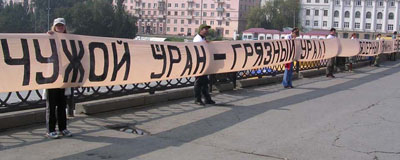
Arctic Frontiers: Disinformation, Security and the Northern Sea Route
Bellona held a seminar on countering Russian disinformation in the Arctic at the Arctic Frontiers international conference in Norway
News

Publish date: November 21, 2005
Written by: Vera Ponomareva
News
The reports authors are experts from the Paris-based World Information Service on Energy (WISE) and Ekozashchita! The report presents data on imports into Russia of spent nuclear fuel (SNF) as well as uranium tails, or waste from the European uranium-processing industry.
The crisis in the nuclear industry is pushing Rosatom towards turning the country into a nuclear dump for both Eastern and Western countries, said Ekozashchita! Co-chairman Vladimir Slivyak, one of the report’s authors. It is essential to stop these economically unprofitably and deeply amoral imports of radioactive waste as soon as possible, otherwise future generations of Russians will be under threat.
The environmentalists say that reprocessing foreign SNF is not only environmentally unsound, but also fatal from an economic point of view, as the Zheleznogorsk Mining and Chemical Combine (MCC) near Krasnoyarsk receives a paltry $120 per kilogram of SNF. Former Nuclear Power Minister Yevgeny Adamov had said in 2001 that nuclear fuel imports are economically viable at prices of at least $1,000 per kilogram—which is how much recycling facilities in the United Kingdom and France charge.
In the four years since the law on SNF imports was passed, Rosatom has earned approximately $120 million dollars instead of the predicted $8 billion.
Thus, Russia does not offer ‘a high-tech SNF recycling service’ (the facility near Krasnoyarsk cannot be upgraded as there is no business in Russia that could do so), but, to all intents and purposes, an SNF-storage service on its territory, says Ekozashchita!
According to Ekozashchita!, since June 2001 some 12 to15 loads of SNF have arrived in Russia from Ukraine and Bulgaria. The latest load of Bulgarian spent fuel—some 48 tonnes—was received by the MCC in Zheleznogorsk (formerly Krasnoyarsk 26) just a week ago.
Environmentalists stage regular protests, and have managed to block several contracts for imports of SNF, including from Hungary, which had planned to send some 1,500 tonnes of nuclear waste.
Uranium tails
Environmentalists say that since 1996 the Western European companies Urenco and Eurodif have been sending radioactive waste (nuclear tails) to Russia for enrichment. The result of this enrichment process is the equivalent of natural uranium. This product is sent back to Western Europe, while the radioactive waste created as a result of this final enrichment remains in Russia.
From 1996 to 2001, some 9,740 tonnes of nuclear waste arrived in Russia from Germany alone.
According to Ekozashchita!, one of the main arguments in favour of sending waste to Russia for enrichment is that Rosatom and its enterprises are agreeable to keeping the uranium tails in Russia. If Urenco and Eurodif had to recycle the nuclear waste themselves, their production costs would go up by approximately 5 times.
Uranium tails are taken to Seversk in the Tomsk Region, Angarsk in the Irkutsk Region, Zheleznogorsk in the Krasnoyarsk Region, and Novouralsk in the Sverdlovsk Region.
We have been doing uranium enrichment for a long time, and this is no secret, Nikolai Shingarev, director of Rosatom’s information centre, told Bellona Web.
There is nothing illegal about this.
According to Shingarev, the imported uranium tails are not waste, since they undergo further processing and to not require repository storage. The result of this process is uranium protoxide-oxide, which is safe for storage and can be used in fast-neutron, or breeder, reactors.
At present, the only industrial fast-neutron reactor in Russia is the BN-600 of the OK-505 design at the Beloyarsk NPP.
A change of leadership—a change of course?
The current development of the nuclear sector is pointing towards lower nuclear-safety levels and Russia’s final conversion into a dumping ground for nuclear waste, Ekozashchita! says in its report.
The recent change of leadership at Rosatom has given environmentalists hope: For the first time in many years, Rosatom is headed by a person who is not tied to the interests of the nuclear industry and who is able to assess Russia’s nuclear policy objectively.
We ask Sergei Kiriyenko to scrutinise the development policy formulated by previous heads of this agency, and are prepared to offer our full support in this difficult process, Slivyak wrote in the latest of the weekly press statement that his organisation releases. Tomorrow we will send the new head of Rosatom our newly published report, which brings together the most complete data on imports of nuclear waste to Russia. Even Rosatom itself does not have some of this data.

Bellona held a seminar on countering Russian disinformation in the Arctic at the Arctic Frontiers international conference in Norway

Our December Nuclear Digest, reported by Bellona’s Environmental Transparency Center, is out now. Here’s a quick taste of three nuclear issues arisin...

Bellona has launched the Oslofjord Kelp Park, a pilot kelp cultivation facility outside Slemmestad, about 30 kilometers southwest of Oslo, aimed at r...

Our November Nuclear Digest by Bellona’s Environmental Transparency Center is out now. Here’s a quick taste of just three nuclear issues arising in U...